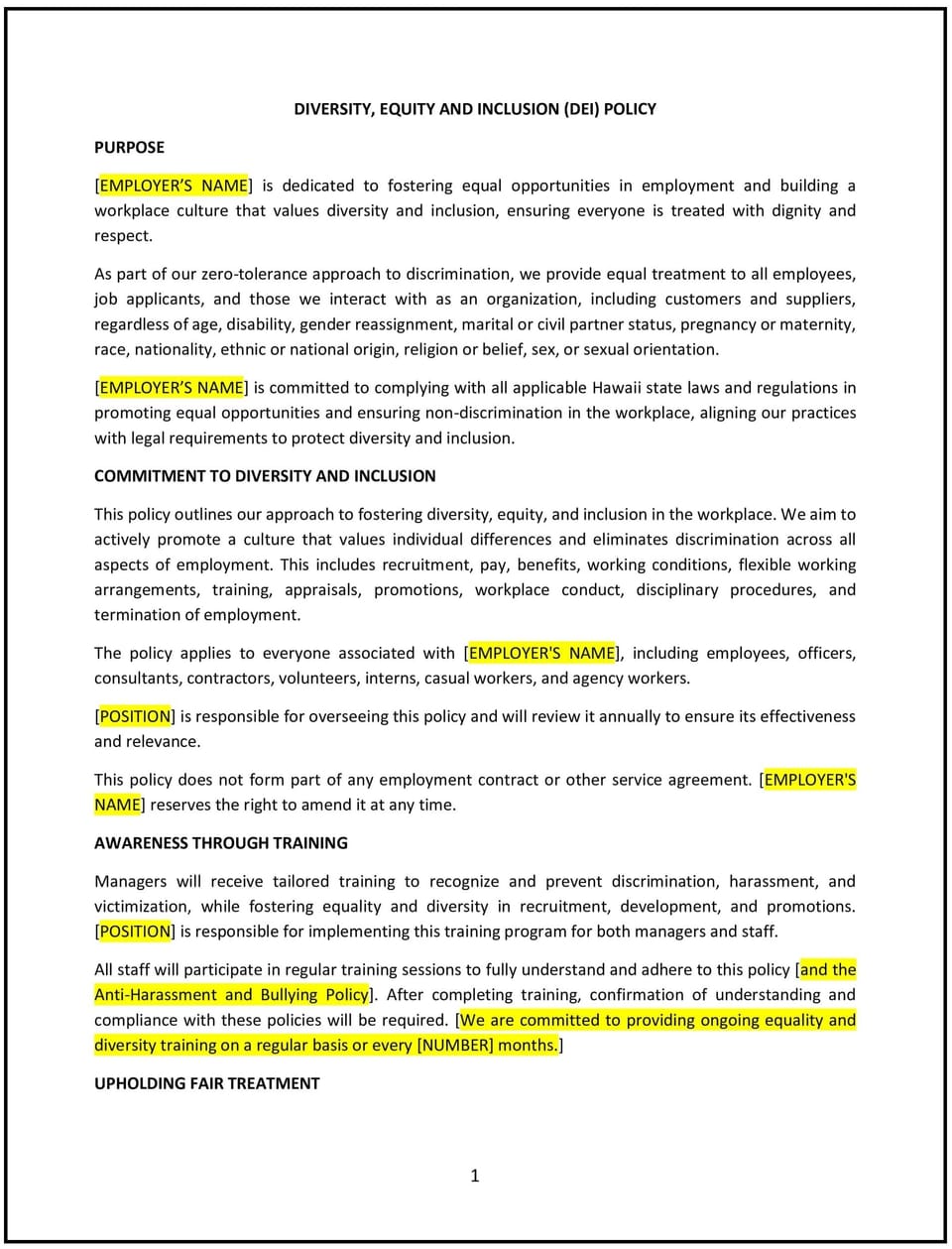Diversity, equity, and inclusion (DEI) policy (Hawaiʻi): Free template

Diversity, equity, and inclusion (DEI) policy (Hawaiʻi)
A diversity, equity, and inclusion (DEI) policy helps Hawaiʻi businesses create a workplace that values and respects the unique backgrounds, perspectives, and contributions of all employees. This policy outlines the business’s commitment to fostering a culture of belonging, addressing systemic inequities, and promoting fairness in hiring, promotion, and workplace practices. Tailored to Hawaiʻi’s diverse cultural landscape, this policy emphasizes inclusivity and respect for the state’s multicultural heritage.
By implementing this policy, businesses in Hawaiʻi can build a more innovative, engaged, and harmonious workforce while reflecting the values of the local community.
How to use this diversity, equity, and inclusion (DEI) policy (Hawaiʻi)
- Define DEI principles: Clearly articulate the business’s commitment to diversity, equity, and inclusion, emphasizing respect for Hawaiʻi’s cultural diversity and unique community values.
- Establish inclusive hiring practices: Provide guidelines for recruiting, interviewing, and hiring candidates from diverse backgrounds, ensuring fair and unbiased processes.
- Promote equitable opportunities: Outline steps to ensure all employees have access to training, mentorship, and advancement opportunities, regardless of their background.
- Address workplace behavior: Set expectations for respectful and inclusive interactions among employees, including zero tolerance for discrimination, harassment, or bias.
- Provide DEI training: Educate employees and managers on topics such as cultural competency, unconscious bias, and inclusive leadership.
- Create employee resource groups (ERGs): Support the formation of ERGs to provide a platform for underrepresented employees to connect and share experiences.
- Measure progress: Regularly collect and analyze data on workforce diversity, employee satisfaction, and DEI initiatives to track progress and identify areas for improvement.
- Communicate the policy: Share the policy with employees during onboarding and through internal communications to ensure awareness and understanding.
- Review and update the policy: Regularly assess the policy’s effectiveness and make adjustments as needed to reflect changes in workforce needs, community values, or industry standards.
Benefits of using this diversity, equity, and inclusion (DEI) policy (Hawaiʻi)
This policy offers several advantages for Hawaiʻi businesses:
- Fosters innovation: A diverse workforce brings a variety of perspectives, leading to more creative solutions and better decision-making.
- Enhances employee engagement: Inclusive workplaces promote a sense of belonging, increasing employee satisfaction and retention.
- Reflects community values: Tailoring the policy to Hawaiʻi’s multicultural heritage demonstrates respect for the local community and its traditions.
- Attracts top talent: A strong commitment to DEI makes the business more appealing to job seekers who value inclusivity and fairness.
- Improves workplace culture: Promoting respect and equity creates a positive and supportive environment for all employees.
- Strengthens reputation: Demonstrating a commitment to DEI enhances the business’s reputation among customers, partners, and the community.
- Aligns with legal and ethical standards: The policy helps businesses align with Hawaiʻi state laws and federal regulations promoting equal opportunity and non-discrimination.
Tips for using this diversity, equity, and inclusion (DEI) policy (Hawaiʻi)
- Communicate the policy effectively: Share the policy with employees during onboarding and through regular reminders, such as emails or training sessions.
- Provide DEI training: Educate employees and managers on topics such as cultural competency, unconscious bias, and inclusive leadership.
- Encourage employee participation: Support the formation of employee resource groups (ERGs) and involve employees in DEI initiatives.
- Measure progress: Regularly collect and analyze data on workforce diversity, employee satisfaction, and DEI initiatives to track progress and identify areas for improvement.
- Be transparent: Share DEI goals, progress, and challenges with employees to build trust and accountability.
- Review the policy periodically: Update the policy as needed to reflect changes in workforce needs, community values, or industry standards.
Q: Why should Hawaiʻi businesses adopt a DEI policy?
A: Businesses should adopt this policy to foster innovation, enhance employee engagement, and reflect Hawaiʻi’s multicultural values.
Q: What are the key components of a DEI policy?
A: A DEI policy should include inclusive hiring practices, equitable opportunities, respectful workplace behavior, DEI training, and measurable goals.
Q: How can businesses promote equitable opportunities?
A: Businesses should ensure all employees have access to training, mentorship, and advancement opportunities, regardless of their background.
Q: What training should businesses provide to employees?
A: Businesses should educate employees on topics such as cultural competency, unconscious bias, and inclusive leadership.
Q: How can businesses measure DEI progress?
A: Businesses should collect and analyze data on workforce diversity, employee satisfaction, and DEI initiatives to track progress and identify areas for improvement.
Q: What role do employee resource groups (ERGs) play?
A: ERGs provide a platform for underrepresented employees to connect, share experiences, and contribute to the business’s DEI efforts.
Q: How often should the policy be reviewed?
A: The policy should be reviewed annually or as needed to reflect changes in workforce needs, community values, or industry standards.
This article contains general legal information and does not contain legal advice. Cobrief is not a law firm or a substitute for an attorney or law firm. The law is complex and changes often. For legal advice, please ask a lawyer.


